
Chinese authorities have announced a “nationwide centralised management of spy cameras,” stipulating that social media and ecommerce platforms will be held accountable if they fail to purge spy camera tutorials and hidden camera equipment. This comes as yet another push by Beijing to tighten privacy laws.
A joint statement by the Central Cyberspace Administration of China (CAC), the Ministry of Industry and Information Technology (MIIT), the Ministry of Public Security and the State Administration of Market Supervision (SAMR) released on Friday states that the government launched a three-month campaign to crack down on the substantial underground market for hidden cameras and spying equipment.
The document outlines that criminals are increasingly using hacking techniques to control cameras in homes and public places, convert smartphones and smartwatches and turn them into equipment used for spying. “A chain of illicit production has been formed, which seriously infringes upon the privacy of citizens,” a concern that the new law aims to tackle.
Chinese spy cameras with built-in memory and WiFi connection have become widely available on ecommerce sites and have been found in hotel rooms, public bathrooms and even private homes.
On social media, tutorials can be purchased that teach users how to gain access to home security camera feeds, and private chat groups exist where participants can exchange videos of secretly recorded footage.
Regulators are now demanding that product manufacturers and online platforms do their part in addressing these blatant violations of privacy. In addition, social media sites and forums will also need to remove hacking tutorials, exploitation tools and the trading of secretly recorded videos.
How well do you really know your competitors?
Access the most comprehensive Company Profiles on the market, powered by GlobalData. Save hours of research. Gain competitive edge.

Thank you!
Your download email will arrive shortly
Not ready to buy yet? Download a free sample
We are confident about the unique quality of our Company Profiles. However, we want you to make the most beneficial decision for your business, so we offer a free sample that you can download by submitting the below form
By GlobalDataSpy camera manufacturers and video surveillance service providers are required to improve their products’ security protection. Meanwhile, ecommerce platforms need to purge “counterfeit and poorly made” cameras, the joint statement said.
Internet firms who fail to carry out these rectifications will be “severely punished” according to laws and regulations, the regulators said in the notice.
Privacy, but for whom?
This announcement follows the release of China’s Data Security Law, which was also introduced on Friday. This piece of legislation gives authorities unprecedented power to shut down tech companies that collect data illegally. Arguably, these new laws are part of Beijing’s effort to control big tech companies such as Alibaba and Tencent.
The Chinese government’s doubling down on privacy protection is somewhat an ironic move, as the country holds one of the world’s most extensive mass surveillance systems to monitor its citizens. The state keeps tabs on people on the internet and in real life with a vast network of security cameras and other digital technologies.
Mass surveillance in China is closely linked to the country’s Social Credit System, which was formally introduced in 2011. The system tracks citizens and businesses and evaluates their trustworthiness.
Depending on one’s score, an individual or corporation may be banned from accessing certain services or goods, such as buying plane or train tickets.
The system’s implementation relies heavily on technology, including facial recognition, big data analysis and artificial intelligence (AI).
As part of its Digital Silk Road initiative, China is now also rolling out its surveillance technology to other countries. Last year alone, at least 13 African nations signed agreements with China agreeing on closer digital cooperation.
However, the actual number of partnered countries is expected to be much higher, as memoranda of understanding (MOUs) do not always show whether China and the other country have agreed on a digital partnership. The Diplomat reported that as many as 138 countries are involved in China’s Digital Silk Road project.






